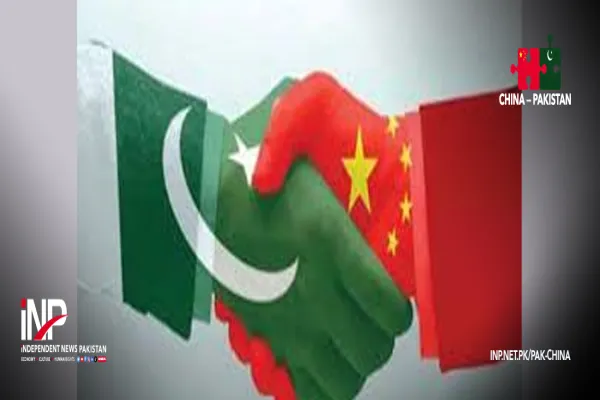i NEWS PAK-CHINA
After six months in China's spacescraft under the first-ever Sino-Pak ‘Seeds in Space’ project, seven kinds of Pakistani medicinal seeds returned to the earth and their motherland. According to China Economic (CEN), the seeds, three kinds provided by the International Centre for Chemical and Biological Sciences (ICCBS), University of Karachi and four by Hamdard University, have made history as the first to aboard the Chinese space station and opened a new chapter for S&T cooperation between China and Pakistan. This is an extraterrestrial way to enhance food production. Space-bred varieties have proved to be able to perform better in terms of production and resistance, and the return of seeds from space is only the start.
After Pakistan's medicinal seeds return to the earth, Pakistan and China will conduct joint research on their genetic stability, material basis, effectiveness and safety by comparing the seeds on board with their mother seeds on the earth to screen out new medicinal materials with higher quality and higher yield, Dr. Jiang Ning, Deputy Secretary-General of Sino-Pakistan Cooperation Center on Traditional Chinese Medicine, National Administration of Traditional Chinese Medicine, China, told China Economic Net in an interview. How is that achieved? Scientific study shows that microgravity, cosmic radiation and very low temperatures outside the space station can induce genetic mutations that could make the plants more productive and resilient to climate fluctuations resulting from climate change.
So far, China, the third country in the world after the US and Russia to achieve satellite breeding in space, has cultivated more than 200 new space-bred varieties with an annual planting area of 2-3 million hectares. Among them, wheat variety Luyuan 502 has increased production by 11% more than ordinary varieties and manifested better resistance to drought, diseases and pests. “There is no way to transform plant seeds in a set direction, but it is possible to achieve our intended outcomes by sending them to space. For medicinal plants, we hope they can grow better with stronger resistance, survival rate, and efficacy.
All can be achieved via genetic mutation in space”, said Dr. Wang Yan, Assistant Professor of Chemical and Biological Sciences, University of Karachi. Aboarding China’s Shenzhou 14 manned spacecraft, Pakistan's medicinal plant seeds have undergone 6 months of scientific experiments. "[It] represents a landmark in China-Pakistan S&T cooperation and will be recorded in the history of their friendship,” said Pang Chunxue, Charge d'Affaires of the Chinese Embassy in Pakistan, terming the experiment as a milestone of China-Pakistan scientific and technological cooperation. The bilateral science and technology cooperation has been included under the framework of China-Pakistan Economic Corridor (CPEC).
“The scientific experiment cooperation is a concrete manifestation of China’s willingness to share the fruits of high-tech development with Pakistan,” said Cao Zhouhua, Science Commissioner of the Chinese Embassy in Pakistan. He said that China’s space station is an important part of the UN’s “Shared Global Space” initiative and is open to all UN member States. Scientific and technological cooperation is an important part of China- Pakistan relations. Since the signing of the Intergovernmental Agreement on Scientific and Technical Cooperation in 1976, the two sides have jointly funded more than 475 research projects in the fields of agriculture, aerospace, water conservation, chemical industry, medical and health care, biotechnology, computer science, environment, energy and technology management. Sending seeds to the space will never be the end of China-Pakistan cooperation in space.
As Professor Ahsan Iqbal, Minister for Planning, Development and Special Initiative (PD&SI), put it, “Space technology is one of those technologies which is most critical for human development and security of any nation”, adding that “collaboration with China will open doors of development for us in future”. Take the Sino-Pakistan Seed Orbit Breeding Project as an example. Prof. Liu Xinmin - Member, Expert Advisory Panel on Traditional Medicine, WHO - noted that the project will surely boost Sino-Pakistan cooperation on R&D of medicinal plants based on the Chinese Space Station. He told the reporter, for seeds of the same medicinal plant, comparative studies can be conducted, such as breeding, cultivating, chemical components, efficacy, and safety, etc when they returned to the Earth.
“It will promote the further utilization of space in the future,” said Liu, who is also the Chief Scientist in the Institute of Drug Discovery Technology (IDDT), Ningbo University(NBU), China. Also, both countries can jointly train young scholars in this field, Liu added. Professor Shahid Baig, Chairman of the Pakistan Science Foundation (PSF) noted that the prospects of collaborations are immense, and “I believe that these synergies between Pakistan and China will open up new horizons of economic and technological development”.
“The Shenzhou 12 mission carried the national flag of Pakistan, and the Shenzhou 14 mission carried Pakistan’s plant seeds, which fully showcase profound friendship between China and Pakistan”, said Liu Boming, a veteran Chinese astronaut in a video reply to Aasiya Ismail, a 17-year-old girl from Islamabad Model School for Girls, Pakistan. “[Sending Pakistani seeds into the Chinese space station] is the first time, but for sure, not the last,” Prof. Liu Xinmin told the reporter.
There is every reason to believe that China-Pakistan space cooperation will cover more areas and benefit more people from both countries and beyond in days to come. “The Ministry of Science and Technology, Government of Pakistan will continue to extend support toward the Pakistani scientist and pursuing meaningful collaboration with their Chinese friends in the field of science and technology and innovation,” pinpointed Ghulam M. Memon, Federal Secretary, Ministry of Science and Technology, Pakistan.
Credit: Independent News Pakistan-INP









